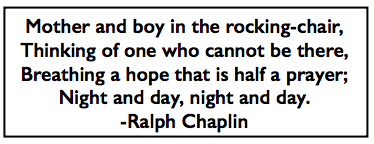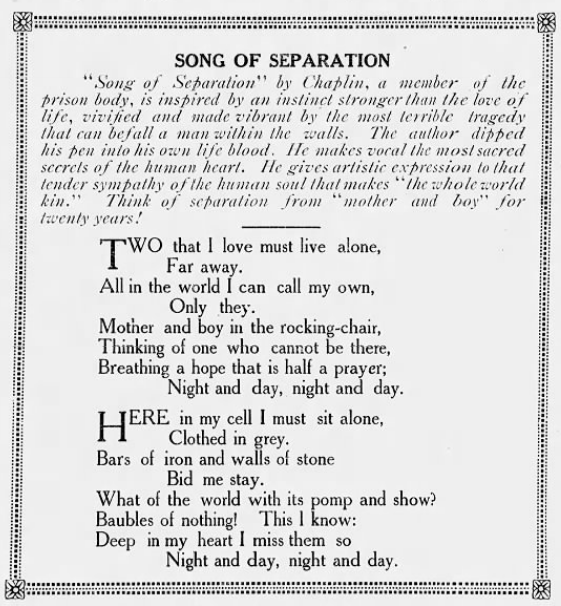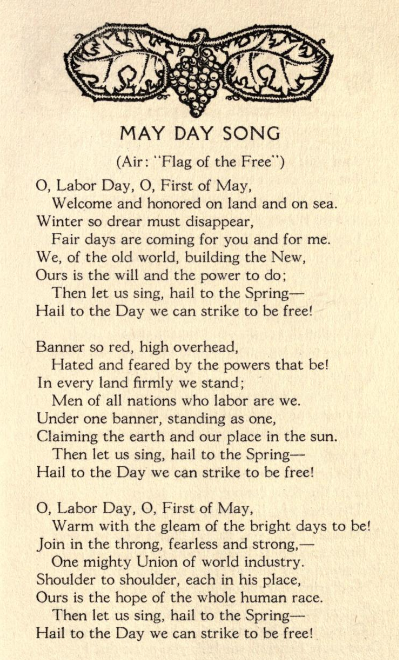 ———-
———-
Hellraisers Journal – Wednesday May 14, 1919
Upton Sinclair Exposes the Barbaric Sedgwick County Jail
From the Appeal to Reason of May 10, 1919:
Hell Holes in America
In the Amnesty Edition of the Appeal I reproduced a circular sent out by the I. W. W. boys, describing the terrible conditions in the Sedgwick county jail at Wichita, Kans. I made no investigation of their statements, but acted on my general impulse to believe the worst about American jails. Those which I have investigated in past times have disposed me to believe that nobody could possibly exaggerate their evils. But soon after this article appeared in the Appeal I received letters from several correspondents who reported that they had complained to the Governor of Kansas about the matter, and had received from him a report of a confidential investigation which he had had made into this Wichita jail. The report stated that conditions in the jail were excellent, and that all the accounts sent out by the I. W. W. were false.
Now the Governor of Kansas, Henry J. Allen, is a progressive politician and a gentle man. I feel acquainted with him from reading “The Martial Adventures of Henry and Me,” by William Allen White-Governor Allen being the Henry” of that book. So I began to feel real bad about what I had published, and made ready to apologize to Governor Allen, and also to the readers of the Appeal for the blunder I had made.
But I studied that report again and noted that the Governor’s investigator denied that the I. W. W. boys had been arrested for trying to call a strike of the oil workers. He said they had been arrested for hindering the prosecution of the war. I have encountered that official bunk so often that I know the type of mind that swallows it.
And then I recalled the many, many times in my life when I had followed the work of official investigators, in cases with which I myself was entirely familiar. I recalled, for example the statement given out about the county jail here in Los Angeles, that the prisoners had had lice brought in and put them on their bodies prior to my inspection! I recalled Major Louis L. Seaman of the United States army, who investigated the Chicago stockyards for Collier’s Weekly, at the time when the Appeal to Reason was publishing “The Jungle.” Major Seaman was a gentleman of undoubted integrity, and he reported that everything was lovely in that inferno of graft. You see, these gentlemen of undoubted integrity have their class point of view, and they let themselves be escorted around, and they only see what they are shown-and even then, most of the time they don’t realize what they are seeing!
So I decided that before I apologized to Governor Allen, I would inquire a little farther. I wrote to Caroline Lowe, a woman who has interested herself in the defense of political prisoners, and asked if she happened to know anything about this particular jail. In reply came a letter which speaks for itself and which I quote:
Regardless of any denial made by the Governor of the State of Kansas, I can testify of my own knowledge that the conditions not only in the Wichita jail but in the jail at the State capitol at Topeka, Kans., beggar description. The rotary tank in the jail at Wichita is a relic of barbarism. I have been in the jail many times and have seen this tank in operation.
It is a steel structure as described in the enclosed; it rotates on a central pivot, and at the time I saw it, was operated by a great iron lever which extends into the main vestibule of the jail, and requires the service of two men to move the lever that turns the tank, thereby bringing the exit of the tank in line with the door opening into the vestibule of the jail. While I have never entered the tank itself, I have stood at the window of the vestibule and the odor coming from underneath the tank was most intolerable. The jail is very old and should have been torn down years ago. In fact, I was told that bonds were voted to build a new jail, but that opposition on the part of certain prominent interests caused the project to die and the old jail remains a disgrace to any civilized community. The jail is filthy and unsanitary from every standpoint, and as a result of the sixteen months’ confinement [awaiting trial], several of the Wichita defendants are in a very weak and emaciated condition.
The jail at Topeka is almost as bad. The last time I visited the boys in this jail, although it was only four o’clock in the afternoon and the sun was shining brightly, the tank in which they were confined was so dark and the little electric light in the ceiling so dim that the boys were using tallow candles with which to read by. They were locked away from the toilet from seven o’clock in the evening until seven o’clock next morning, and ill-smelling tin pails were the only toilet facilities accessible.
I am very glad that you wrote me regarding this and appreciate your cooperation in aiding us to secure publicity. With best wishes for your continued success, I am,
Very sincerely yours, Caroline A. Lowe.
But even that did not satisfy me entirely. I thought perhaps maybe Caroline Lowe is one of these “hysterical women” that public officials tell us about, when they are defending the profit system and its products. So I thought I would ask some MAN. I wrote the head of the National Civil Liberties Bureau, with whose work I have kept in close touch. I have observed that these people are rigidly exact in their statements; in fact, I have several times thought they erred on the side of moderation. I would be willing to stake my reputation on their word, and so I asked what they knew about this Wichita jail, and I give herewith their reply. I hope that the correspondents who wrote me about the matter will not fail to make note of it, and to take it to Governor Allen and use it to make him just as uncomfortable as they possibly can.
Some years ago after I had served my time in the State of Delaware for playing tennis on Sunday, I said that I would like to make a week in jail a part of every college course, and a prerequisite of ordainment for every minister, and for appointment or election as a judge. I would like to add to this list every Governor. I will specially recommend to Governor Allen of Kansas that the should give out the announcement that he is going away on a fishing trip. The trout season is now open and he can very easily do this. Let him then disappear from the Governor’s mansion, and put on workingmen’s clothes, and put a red card in his pocket, and go out and call for a strike of the oil workers, so he will obtain very quickly some real knowledge about conditions in the Sedgwick county jail. I have sufficient confidence in his integrity to agree in advance to publish in these columns whatever he may have to say about his discoveries.
The letter from the National Civil Liberties Bureau follows:
I have yours of March 31st. I am enclosing herewith a copy of the litter written to the Attorney General, describing conditions in the Sedgwick county jail at Wichita, Kans. In response to this letter I have two evasive replies from the Department, but when asked specifically to say whether or not the statements of fact contained in the letter were true, no reason was forthcoming.—–of the staff of the Survey went out to make an investigation of Federal, military and civil prisoners for us and for the Survey. In the course of his travels he went to the Sedgwick county jail at Wichita. I am sorry that I cannot send you his full reprot. It is not yet in shape for publication, but I can assure you the statements of fact contained in my letter are accurate and are borne out by what he saw with his own eyes. For example, he was in the Rotary Tank himself and says that no description which we have is overdrawn.
Sincerely yours, Albert De Silver.
[From the N. C. L. B. to U. S. Attorney General Gregory:]
Hon. Thomas W. Gregory, Attorney General, Washington, D. C.
My Dear Mr. Gregory:
We wish to lay before you certain facts that have recently come to our attention relative to conditions existing in the Sedgwick county jail at Wichita, Kans., in which a number of Federal prisoners are held awaiting trial. The reports which we have received have come to us from three sources, and it is our belief that they call for the immediate and searching investigation which we feel sure you will cause to be made.
We summarize the conditions described as follows: In the Sedgwick county jail at Wichita, Kans., at one end of a corridor is an arrangement of cells known as the “rotary tank.” It consists of a cylindrical steel contrivance said to weigh thirty-five tons and in which are found two tiers of ten cells, one superimposed upon the other. The cells in the tank are so arranged as to be about twenty inches in width at the front-or circumference of the cylinder. The only cells that receive any light are those that happen to be opposite the corridor. The remaining eighteen are in darkness.
Whenever it is desired to enter one of these cells, it is necessary to resolve [revolve?] the whole tank with a hideous noise until the desired cell is opposite the corridor. The inmates receive their meals by this same revolving process, each prisoner snatching his tray as his cell passes the corridor. The cells are furnished with a cot and a toilet located at the back. The sanitary arrangements are most inadequate, the human refuse being carried down to a trough at the base of the cylinder where it remains until one of the jailers happens to flush it. A week sometimes passes before the trough is flushed and the resulting conditions can easily be imagined. The cells are also said to be infected with rats and vermin.
My information does not specifically state whether or not the cells in the so-called tank are punishment cells, but the fact that men are held there for long periods of time seems to indicate that such is not the case. One man-Carl Schnell-was imprisoned in one of these cells for sixty-eight days, during which time he lost twenty-nine pounds in weight.
We, of course, realize that the Department of Justice has no jurisdiction to remedy conditions in this or any other state penal institution, but we assume that it is within the power of the Department to see to it that Federal prisoners or persons held awaiting trial under the laws of the United States are imprisoned under conditions which are consistent with the dictates of humanity. It is because we are convinced that the conditions which we have described do not meet this test and because we believe that such cells are not fit places in which to imprison human beings, no matter of what crimes they have been convicted, or are accused, that we lay these facts before you. We are taking the liberty of forwarding a copy of this letter to Hon. Arthur Capper, Gov. Henry J. Allen and Mr. William Allen White.
Sincerely and respectfully yours,
The National Civil Liberties Bureau.———-
Our Friends in Jail
My mail is full these days of letters from prisoners. I have quoted some of them in the Appeal. Some of the more terrible I cannot quote because they have been smuggled out “by the underground route,”and the writers ask that nothing be said about it.
Many of them ask for help for their families. I wonder who suffers the most, the Socialist who is grabbed and shut up in jail, or his wife and children who stay outside and beg to keep from starving?
Also I am struck by the fact that so may of the prisoners ask for books. Strange things must be going on in our jails these days! I know a score of prisons in which copies of “The Cry for Justice” are being passed around. The prisoners like this book, because it is big, and it lasts a long time, and time is the biggest trouble you have in jail. One writes me that he finds something for every sort of taste, and that he could keep a dozen copies in circulation if he had them. It appears that the Appeal has bought a big edition of this book. I wonder if any of those who have bought copies and read them would like to chip in and raise a fund to put a copy in all our prison libraries? I offer to contribute the book at wholesale prices and to forego my own royalties.
Among the political prisoners whose letters I have quoted on this page is Ralph Chaplin, the I. W. W. poet who is serving twenty years in Leavenworth prison. Chaplin is the author of a poem, “When the Leaves Come Out,” which you will find in “The Cry for Justice,” and he is one who is keeping a couple of copies of this book in circulation. He has just sent me a copy of the Leavenworth New Era, a paper edited and published by the nineteen hundred inmates of the institution-more than seven hundred of whom are political prisoners. It would appear that these political prisoners have made considerable impression upon the spirit of the institution, for I notice hints of change. Here is a poem of Chaplin’s published in a recent issue. I give it with the editor’s note, just as it appears in the prison paper. It is the first time I ever saw a prison paper in which prisoners were permitted to protest against imprisonment!
In my demand for amnesty for political prisoners, published in the Appeal’s amnesty edition, I mentioned the case of a young friend, Don Stephens of Arden, Del. I have just received a letter from Don, giving some interesting information about the state prison of Delaware, in which he and I were confined together eight years ago, for the dreadful offense of playing tennis on Sunday. The letters reads:
I finished my bit and was released eight days ago. It is wonderful to be out in the sun and air again and with those I love. Jails at the best are terrible places, and that in which I was lodged was a long, long way from the best.
You will be pleased to learn that the short visit we (ten little Ardenites) paid that institution some years back and the publicity you gave to conditions then led to social improvements-chief of which was the building of an outside recreation yard. Some of the old timers expressed heartfelt appreciation for the good work you did.
I was rather surprised that your little magazine was allowed to pay monthly visits (an oversight I’m sure)! It was passed around to quite a large circle of readers and was much enjoyed.
Sincerely, Don Stephens.
[Clip added of Chaplin’s poem is from Leavenworth New Era of March 14, 1919.]
[Emphasis and paragraph breaks added.]
~~~~~~~~~~~~~~~~~~~~~~
SOURCE
Appeal to Reason
(Girard, Kansas)
-May 10, 1919
https://www.newspapers.com/image/67587364/
IMAGE
POEM Ralph Chaplin, Song of Separation, Lv Nw Era p4, Mar 14, 1919
https://www.newspapers.com/image/488895791/
See also:
Appeal to Reason, Amnesty Edition
(Girard, Kansas)
-Mar 1, 1919; No. 1,213
https://www.newspapers.com/image/67587269/
Tag: Wichita IWW Class War Prisoners
https://weneverforget.org/tag/wichita-iww-class-war-prisoners/
The Survey, Volume 42
-Apr-Sept 1919
(New York, New York)
Survey Associates, 1919
https://books.google.com/books?id=xmc6AQAAMAAJ
The Survey of Sept 6, 1919
https://play.google.com/books/reader?id=xmc6AQAAMAAJ&printsec=frontcover&pg=GBS.PA787
“Uncle Sam: Jailer” by Winthrop D. Lane, Survey Staff
https://play.google.com/books/reader?id=xmc6AQAAMAAJ&printsec=frontcover&pg=GBS.PA806
Re Sedgwick County Jail, see “IV”
https://play.google.com/books/reader?id=xmc6AQAAMAAJ&printsec=frontcover&pg=GBS.PA810
RE the “rotary tank”
https://play.google.com/books/reader?id=xmc6AQAAMAAJ&printsec=frontcover&pg=GBS.PA811
William Allen White
https://en.wikipedia.org/wiki/William_Allen_White
Tag: Caroline A Lowe
https://weneverforget.org/tag/caroline-a-lowe/
Tag: National Civil Liberties Bureau
https://weneverforget.org/tag/national-civil-liberties-bureau/
Albert De Silver (1888-1924)
https://www.findagrave.com/memorial/113139267/albert-de_silver
Re Carl Schnell, see:
American Political Prisoners
Prosecutions Under the Espionage and Sedition Acts
-by Stephen Martin Kohn
Greenwood Publishing Group, 1994
(search: “carl schnell”)
https://books.google.com/books?id=-_xHbn9dtaAC
Cry for Justice
-ed by Upton Sinclair
NY, 1915
https://archive.org/details/cryforjusticean01sincgoog/page/n10
“Gunmen” in West Virginia (“When the Leaves Come Out”)
-by a Paint Creek Miner (Written during the terrible strike of 1911-12)
https://archive.org/details/cryforjusticean01sincgoog/page/n290
When the Leaves Come Out by Ralph Chaplin
Cleveland, OH, 1917
https://archive.org/stream/whenleavescomeou00chapiala#page/n5/mode/2up
POEM: “When the Leaves Come Out”
https://archive.org/stream/whenleavescomeou00chapiala#page/6/mode/2up
Re Don Stephens, see:
The Autobiography of Upton Sinclair
by Upton Sinclair
Pickle Partners Publishing, Nov 11, 2016
(search: “donald stephens”)
https://books.google.com/books?id=WYV_DQAAQBAJ
For more on Don Stephens, see:
Arden
-by Mark Taylor
Arcadia Publishing, 2010
(search: “don stephens”)
https://books.google.com/books?id=9KxJTJw2GE4C
Upton Sinclair’s
A Monthly Magazine: for Clean Peace and the Internation
(Pasadena, California)
-April 1918-Feb 1919
https://books.google.com/books?id=i0w9AQAAMAAJ
~~~~~~~~~~~~~~~~~~~~~~~~~~~~~~~~~~~~~~~~~~~~~
May Day Song by Ralph Chaplin
(Tune: “Flag of the Free”)
https://archive.org/stream/whenleavescomeou00chapiala#page/6/mode/2up



